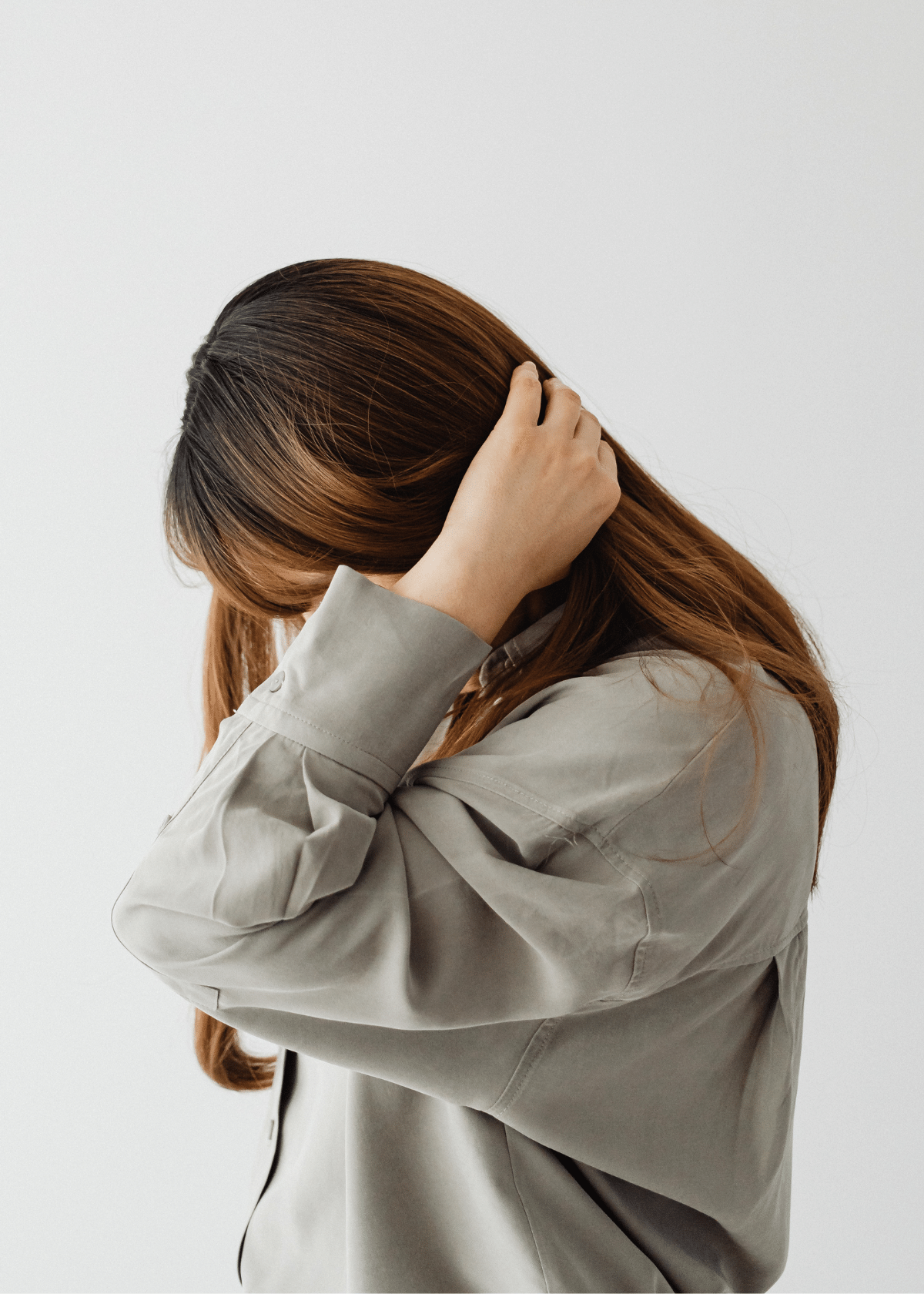We’ve all been there. You’re minding your own business, going about your day, when suddenly —— the itch hits. And not just any itch, we’re talking about the kind of itch that feels like there are a million tiny bugs living in your scalp. The kind of itch that makes you want to claw your head off. The kind of itch that can only be alleviated by scratching...and scratching...and scratching. But here’s the thing. As much as you might want to, you can’t just start scratching away at your head like a monkey. Not only will this do nothing to relieve the itch, but it will also most likely result in some major hair damage. So what’s a girl (or guy) to do? Read on for our tips on how to scratch an itchy scalp without ruining your hair.
The first step is to identify the source of the itch. There are a number of things that can cause an itchy scalp, including dandruff, dry skin, seborrheic dermatitis, psoriasis, and even certain hair products. Once you’ve determined the cause of the itch, you can take steps to treat it accordingly. For example, if dandruff is the culprit, you might want to try using a dandruff shampoo or medicated cream. If your scalp is dry, you might need to switch up your hair care routine or use a moisturizing treatment.
Once you’ve taken care of the underlying issue, it’s time to focus on relieving the actual itchiness. One quick and easy way to do this is by using a cold compress. Simply wet a washcloth with cold water and apply it to your scalp for a few minutes. Or, if you have one handy, you could also use a bag of frozen peas or corn kernels wrapped in a thin towel. Another option is to mix 1 part apple cider vinegar with 3 parts water and apply it to your scalp with a cotton ball. Leave it on for 5-10 minutes before rinsing out with cold water. This will help soothe the itching and also give your scalp a healthy boost!
No one enjoys dealing with an itchy scalp — but luckily there are some simple things you can do to get relief without damaging your hair in the process! By following these tips, you can scratch that itch away while keeping your locks looking gorgeous at the same time!
Choosing the right shampoo
- Consider your hair type: Determine whether you have oily, dry, normal, or combination hair. Look for shampoos that are specifically formulated for your hair type to address its unique needs.
- Identify any specific concerns: If you have dandruff, color-treated hair, or a sensitive scalp, choose a shampoo that targets those concerns. Look for shampoos labeled as anti-dandruff, color-safe, or gentle on the scalp.
- Read the ingredient list: Avoid shampoos that contain sulfates, parabens, and other harsh chemicals that can strip the natural oils from your hair. Opt for shampoos with natural ingredients like aloe vera, tea tree oil, or argan oil, which can nourish and protect your hair.
- Consider your hair goals: If you want to add volume, choose a volumizing shampoo. For frizz control, opt for an anti-frizz or smoothing shampoo. If you have damaged hair, look for a repair and restore shampoo. Identify your specific hair goals and select a shampoo that aligns with them.
- Test and adjust: It may take some trial and error to find the perfect shampoo for your hair. Try different brands and formulas until you find the one that works best for you. Pay attention to how your hair feels and looks after using a particular shampoo, and make adjustments accordingly.
Scratching an itchy scalp without ruining your hair:
- Use your fingertips: Gently massage your scalp with your fingertips, focusing on the itchy areas. Avoid using your nails, as they can cause damage to your scalp and hair.
- Apply a natural remedy: Try applying a natural remedy like aloe vera gel, tea tree oil, or coconut oil to soothe the itchiness. These ingredients have antimicrobial and anti-inflammatory properties that can provide relief.
- Rinse with cold water: Washing your hair with cold water can help calm the itchiness and reduce inflammation. Hot water can aggravate the scalp and strip away natural oils, leading to further dryness and itching.
- Avoid over-washing: Washing your hair too frequently can dry out your scalp and exacerbate the itchiness. Aim for a balance by washing your hair every other day or every few days, depending on your hair type.
- Choose a gentle shampoo: Opt for a mild, sulfate-free shampoo that is gentle on the scalp. Harsh chemicals in certain shampoos can worsen the itchiness and lead to dryness. Look for shampoos specifically designed for sensitive scalps.
- Keep your scalp hydrated: Moisturize your scalp regularly by using a hydrating hair mask or applying a few drops of oil, such as jojoba or argan oil, to your scalp. This can help alleviate dryness and itchiness.
Remember, if you have persistent or severe scalp itching, it's best to consult a dermatologist or a healthcare professional for a proper diagnosis and treatment.
FAQs and answer about Itchy Scalp
What causes an itchy scalp?
Several factors can contribute to an itchy scalp, including dryness, dandruff, scalp psoriasis, eczema, allergic reactions, fungal infections like ringworm, and even excessive use of certain hair products.
How can I tell if my itchy scalp is due to dandruff?
Dandruff is characterized by white or yellow flakes on the scalp and in the hair. It is often accompanied by itchiness and can sometimes cause redness or irritation.
Are there any home remedies for an itchy scalp?
Yes, there are several home remedies you can try. Applying aloe vera gel, tea tree oil, coconut oil, or apple cider vinegar to the scalp may help soothe itchiness. Additionally, regularly washing your hair, keeping your scalp clean, and avoiding harsh hair products can also provide relief.
Can stress cause an itchy scalp?
Yes, stress can contribute to or exacerbate an itchy scalp. Stress can disrupt the balance of the scalp's natural oils and weaken the immune system, making the scalp more prone to irritation and itchiness.
How can I prevent an itchy scalp?
To prevent an itchy scalp, you can follow these tips:
- Maintain good scalp hygiene: Wash your hair regularly with a gentle shampoo to keep your scalp clean. Avoid using hot water, as it can strip away natural oils and lead to dryness. Be sure to rinse thoroughly to remove all product residue.
- Use a gentle shampoo and conditioner: Choose hair care products that are specifically formulated for your hair type and are gentle on the scalp. Look for shampoos and conditioners that are free of sulfates, parabens, and other harsh chemicals.
- Avoid over-washing: Washing your hair too frequently can strip away the natural oils that keep your scalp moisturized, leading to dryness and itchiness. Aim to wash your hair every other day or every few days, depending on your hair type and needs.
- Be mindful of hair products: Certain hair products, such as styling gels, hairsprays, and mousses, can contain ingredients that may irritate your scalp. Avoid products with alcohol or harsh chemicals and opt for more natural or gentle alternatives.
- Protect your scalp from the sun: Just like your skin, your scalp can get sunburned. Protect it by wearing a hat or using a sunscreen spray specifically designed for the scalp when you're exposed to the sun for extended periods.
- Keep your scalp moisturized: Dryness can contribute to itchiness, so it's essential to keep your scalp moisturized. Use a hydrating hair mask or apply a few drops of natural oils like coconut oil, jojoba oil, or argan oil to your scalp to nourish and moisturize it.
- Avoid excessive heat styling: Heat styling tools like flat irons, curling irons, and hair dryers can dehydrate your scalp and cause itchiness. Minimize the use of these tools or use them on the lowest heat setting to reduce potential scalp irritation.
- Manage stress: Stress can contribute to scalp issues, including itchiness. Practice stress management techniques like meditation, deep breathing exercises, or engaging in activities that help you relax and unwind.
- Avoid scratching: Although it may provide temporary relief, scratching your scalp can worsen the itchiness and potentially damage your scalp and hair. Instead, try gently massaging your scalp with your fingertips to alleviate any discomfort.
- Seek professional help if needed: If you have persistent or severe scalp itchiness that doesn't improve with home remedies, it's best to consult a dermatologist or healthcare professional for a proper diagnosis and personalized treatment plan.
Remember, everyone's scalp is unique, so it may take some trial and error to find the best routine and products that work for you.
When should I see a doctor about my itchy scalp?
If home remedies and over-the-counter treatments do not provide relief, or if your scalp itching is severe, persistent, accompanied by other symptoms, or affecting your daily life, it is advisable to consult a dermatologist or healthcare professional for a proper diagnosis and treatment plan.
Remember, these FAQs and answers are for informational purposes only and should not replace professional medical advice. If you have concerns about your itchy scalp, it's best to consult with a healthcare professional.
We have all been there- that telltale itch that means your scalp is dry, irritated, or otherwise unhappy. Luckily, there are a number of great shampoos on the market that can help to soothe an itchy scalp. We've done the research and found the best of the best, so you can get back to enjoying your life without scratching your head in frustration. The next time your scalp is acting up, reach for one of these itch-free shampoos and say goodbye to discomfort.
Read our article about best cruelty free lipstick here!
Read our article about best nude nail polish here!
Read our article about best lip balm for men here!







